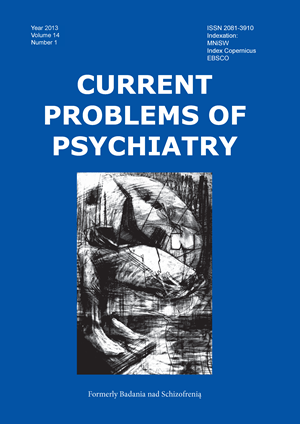Rzadkie powikłania elektrowstrząsów w przebiegu schizofrenii lekoopornej
Keywords:
electroconvulsive therapy, epilepsy, schizophreniaAbstract
Serious adverse events during electroconvulsive therapy in patient with treatment-resistant schizophrenia The case of a male patient suffering from paranoid schizophrenia was presented in this study. He revealed such psychopathological symptoms as delusions of remote control, delusions of thoughts insertion and auditory halucinationations. Pharmacological treatment with conventional antipsychotics available in Poland like zuklopentixol, sulpiride, perphenazine, apotrifluoperazine in combination with valproate was ineffective. Atypical antypsychotic drugs: olanzapine, quetiapine, amisulpride, risperidone, clozapine and sertindole in combination with valproate was ineffective either. Electrocovulsive theraphy was applied to a patient. During the first electroshock serious adverse event occured - status epilepticus. Due to complications during the first electroshock the patient required treatment with antipsychotics. Combined therapy was used. Remission was achieved in four weeks during combined treatment with aripiprazole (15 mg/Day) and valproate (1300 mg/Day).
References
1. Bilikiewicz A., Pużyński S., Rybakowski J., Wciórka J. red Psychiatria T. 2 Urban & Partner, Wrocław 2002.
2. Lieberman JA., Stroup TS., McEvoy JP., Swartz MS., Rosenheck RA., Perkins DO., Keefe RS., Davis SM., Davis CE., Lebowitz BD.,Severe J., Hsiao JK.: Effectivenes of antypsychotic drugs in patients with chronic schizophrenia. N Eng J Med 2005; 353: 1209-23.
3. Buckley PF Aripiprazole: efficacy and tolerability profile of a novelacting atypical antypsychotic. Drugs Today (Barc) 2003;39:145-51.
4. The practice of Elelctroconvulsive Theraphy. Recommendations for Treatment, Training, and Privileging. A task Force Rzadkie powikłania elektrowstrząsów w przebiegu schizofrenii lekoopornej Report of the American Psychiatric Association, APA, Washington DC, 2001.
5. Robert T. Hasse, Tomasz Zyss. Leczenie elektrowstrząsami w praktyce klinicznej. Urban&Partner 2007.
6. Kane JM., Carson WH., Saha AR., McQuade RD., Ingenito GG., Zimbroff DL., Ali MW. Efficacy and safety of aripiprazole and haloperidol versus placebo in patients with schizophrenia and schizoaffective disorder. J Clin Psychiatry 2002;63:763- 771.
7. Potkin SG., Saha AR., Kujawa MJ., Carson WH., Ali M., Stock E., Stringfellow J., Ingenito G., Marder SR. Aripiprazole, an antipsychotic with a novel mechanism of action and risperidone vs placebo in patients with schizophrenia and schizoaffective disorder. Arch Gen Psychiatry 2003;60:681-690.
8. McQuade RD, Stock E, Marcus R, Jody D, Gharbia NA, Vanvvegel S, Archibald D, Carson WH. A comparison of weight change during treatment with olanzapine or aripiprazole: results from randomized, double-blind study. J Clin Psychiatry 2004;65 (Suppl 18);47-56.
9. Kasper S., Lerman MN., McQuade RD., Saha A., Carson WH., Ali M., Archibald D., Ingenito G., Marcus R., Pigott T. Efficacy and safety of aripiprazole vs haloperidol for long term maintance treatment following acute relapse of schizophrenia. Int J Neuropsychopharmacol 2003;6:325-337.
10. Marder SR., McQuade RD., Stock E. Aripiprazole in the treatment of schizophrenia: safety, tolerability in the shorterm, placebo-controled trias. Schizophr Res 2003; 1916:1-14.
11. Pigott TA., Carson WH., Saha AR., Torbeyns AF., Stock EG., Ingenitto GG.: Aripiprazole for the prevention of relapse in stabilized patients with chronic schizophrenia: a placebo controlled 26 week study. J Clin Psychiatry 2003;64:1048-56.
12. Stahl SM. Podstawy farmakologii leków przeciwpsychotycznych i normotymicznych. Via Medica, Gdańsk 2004: 40-139.
13. Correl CU. Acute and long-term adverse effects of antypsychotics. CNS Spectr 2007, 12:10-14.
14. Mamo D., Graff A., Mizrahi R., Shammi CM., Romeyer F., Kapur S. Differential effects of aripiprazole on D(2), 5HT(2), and 5HT(1A) receptor occupancy in patients with schizophrenia: a triple tracer PET study. Am J Psychiatry 2007, 164, 1411-1417.
15. Mago R. Proposed strategies for successful clinical managments with aripiprazol. Expert Opin Pharmacother 2008, 9, 1279-1290.
16. Kalinowski A: Elektrowstrząsy. [W] Psychofarmakologia doświadczalna i kliniczna. Kostowski W. Pużyński S (red). PZWL. Warszawa, 1996, 584-601.
17. Abrams R. Electroconvulsive therapy. Oxford University Press. Oxford 2002.
18. Fink M., Kellner CH., Sackeim HA.: Intractable seizures, status epilepticus and ECT. J ECT 1999; 15: 1237-1238.
19. Povlsen UJ., Wildschiodtz G., Hogenhaven H., Bolwig TG.: nonconvulsive status epilepticus after electroconvulsive therapy. J ECT: 2003; 19: 164-169.
20. Shiloh R., Nutt D., Weizman A.: Essentials in clinical pharmacotherapy, Oxon 2006.
21. Shiloh R., Stryjer R., Weizman A., Nutt D.: Atlas of psychiatric pharmacotherapy. Oxon 2006.
22. Konig P., Glatter-Gotz U.: Combined electroconvulsive and neuroleptic therapy in schizophrenia refractory to neuroleptics. Schizophrenia Res, 1990; 3: 351-354.
23. Bailine SH., Petrides G., Doft M., Lui G.: Indication for use of propofol in electroconvulsive therapy. J ECT 2003;19:129-132.


